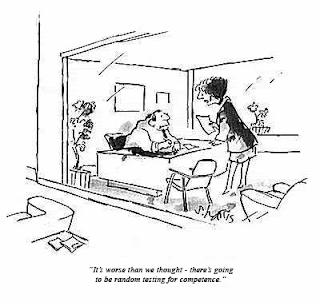The book is by John C. Maxwell and the subtitle is: becoming the person others will want to follow. I have read it, and I truly reccomend it. In this series, I will go over the most important of these qualities that we can all try to develop in our own lives. I have mentioned some of these qualities before, but here is where we get into the nitty gritty stuff.
Today's quality is competence. "If you build it, they will come."
 |
| Just a funny comic about competence. |
Show up everyday
Keep at it. They always say practice make perfect, and it truly does, If you don't believe this, you haven't practice long enough. Keep showing up everyday and working to "cultivate quality" in your life.
Keep improving
Live a goal-oriented life and always be looking for new ways to improve. Begin to understand why you do things and what makes it important to you.
Follow through with excellence
Now that you have your goals and a practice schedule, follow through with it! Do something great with the gifts that you have. It will inspire you to keep moving forward. See a pattern?
Accomplish more than expected
Wow the audience with your excellence. This does not mean that you should work to impress other, but that out of your own integrity, go the extra mile. Find the drive within yourself to do extra work when you know it's worth it!
Inspire others
Combine your personal competence with your leadership skills and
lead the way for your group!
All of these things can seem very idealistic, and determining what needs to be done is much different than actually doing it. To aid in this process, Maxwell includes a list of how to apply these concepts to your own life.
1. Get your head in the game.
Refocus yourself in school, life, or sports. Whatever it may be, decide to recommit yourself to it and get your head in the games.
2. Redefine expectations.
Now that you have recommitted yourself, redefine what you expect from yourself with various activities. If you set the standard high, you are more likely to achieve it, and even if you don't, you will be farther than you were before.
3. Set 3 specific goals.
Find 3 specific ways that you can improve in life. Set a goal that you know you can achieve with hard work. For more information, see my New Year's Resolution article.
All in all, being a good leader begins with competence. It takes hard work, but it pays off! The next quality is problem-solving.

